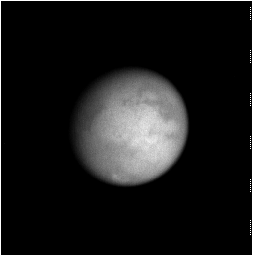
|
Close Encounter of a First Kind
- Click the image above for a larger view
 Movie Download Options
Movie Download Options
Caption:
This movie is a condensed version of Cassini's 44-hour approach to Titan. During the movie, the planet rotates about 40 degrees and the spacecraft's distance to the moon ranges from 1,800,000 to 700,000 kilometers (1,000,000 to 435,000 miles). At is closest, on Oct. 26, 2004, Cassini was 1,200 kilometers (745 miles) above the moon. Clouds are seen forming and evolving near the south pole. The images making up this movie were captured by Cassini's imaging science subsystem through near-infrared filters.
Background Info:
The Cassini-Huygens mission is a cooperative project of NASA, the European Space Agency and the Italian Space Agency. The Jet Propulsion Laboratory, a division of the California Institute of Technology in Pasadena, manages the Cassini-Huygens mission for NASA's Office of Space Science, Washington, D.C. The Cassini orbiter and its two onboard cameras, were designed, developed and assembled at JPL. The imaging team is based at the Space Science Institute, Boulder, Colo.
For more information, about the Cassini-Huygens mission visit, http://saturn.jpl.nasa.gov and the Cassini imaging team home page, http://ciclops.org .
Cataloging Keywords:
| Name | Value | Additional Values |
|---|---|---|
| Target | Titan | |
| System | Saturn | |
| Target Type | Satellite | |
| Mission | Cassini-Huygens | |
| Instrument Host | Cassini Orbiter | |
| Host Type | Orbiter | |
| Instrument | Imaging Science Subsystem (ISS) | |
| Detector | ||
| Extra Keywords | Grayscale, Infrared, Movie, Rotation | |
| Acquisition Date | ||
| Release Date | 2004-10-27 | |
| Date in Caption | 2004-10-26 | |
| Image Credit | NASA/JPL/Space Science Institute | |
| Source | photojournal.jpl.nasa.gov/catalog/PIA06137 | |
| Identifier | PIA06137 | |
